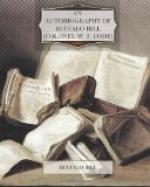One day, after we had been out for some little time, I arranged with Major North to play a joke on Mr. McCarthy. I took him out on a hunt about eight miles from the camp, informing Major North about what time we should reach there. He had agreed that he would appear in the vicinity with his Indians, who were to throw their blankets around them and come dashing down upon us, firing and whooping in the true Indian style.
This program was faithfully carried out. I had been talking about Indians to McCarthy, and he had become considerably excited, when just as we turned a bend in the creek we saw a band of them not half a mile away. They instantly started after us on the gallop, yelling and shooting.
“McCarthy,” said I, “shall we run or fight?”
He did not wait to reply. Wheeling his horse, he started at full speed down the creek. He lost his gun and dropped his hat, but never once did he look back to see if he were pursued. I tried to stop him by shouting that the Indians were Pawnees and our friends. He did not hear me, but kept straight on, never stopping his horse till he reached the camp.
I knew he would tell General Carr that the Indians had jumped him, and that the general would at once start out with troops. So as soon as the Pawnees rode up, I told them to remain there while I rode after my friend.
When I had reached camp, he had given the alarm, and the general had ordered out two companies of cavalry to go in pursuit of the Indians.
I told the general the Indians were only Pawnees, and that a joke had been put up on McCarthy. I neglected to tell him who had put up the joke. He was fond of a joke himself, and did not get very angry. I had picked up McCarthy’s hat, which I returned to him. It was some time before it was discovered who was at the bottom of the affair.
It was while I was stationed at Fort McPherson, where Brevet-Major-General W.H. Emory was in command, that I acted as guide for Lord Flynn, an English nobleman who had come over for a hunt on the Plains. I had been recommended to him by General Sheridan.
Flynn had served in India with the British army. He was a fine sportsman and a splendid shot, and secured many heads and skins while he was with me. Money meant little to him. He insisted on paying all the bills, spending his money lavishly on both officers and men when he was at the Post.
Once, when we ran out of liquid refreshments while on the hunt, we rode thirty miles to a saloon, only to find it closed. Lord Flynn inquired the price of the place, found it to be $500 and bought it. When we left, after having had all we needed to drink, he gave it—house, bar, stock, and all—to George Dillard, who had come along with the party as a sort of official bartender.
Sir George Watts-Garland also made a hunt with us. He was an excellent hunter and a thorough gentleman, but he lacked the personality that made Lord Flynn one of the most popular visitors who ever came to the Post.




